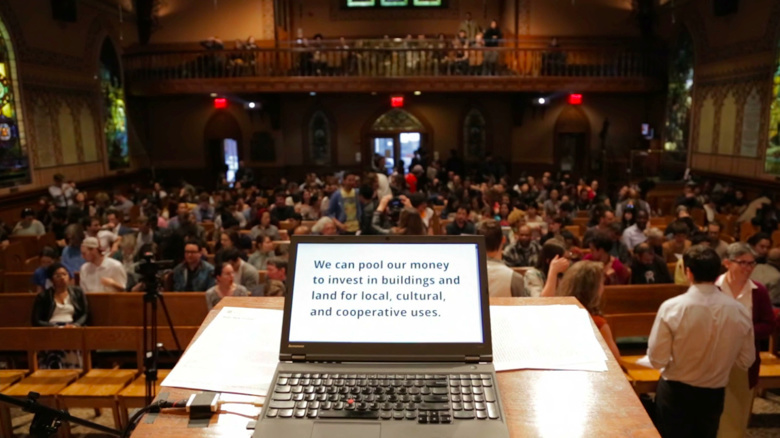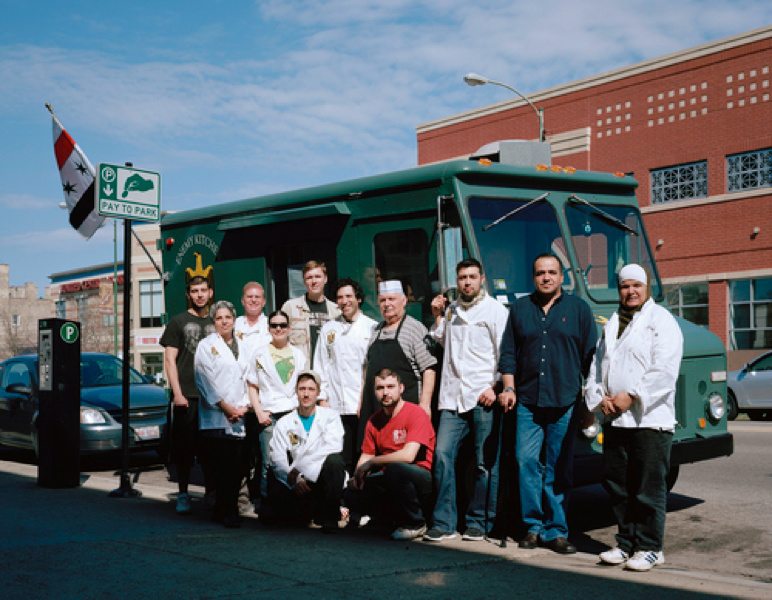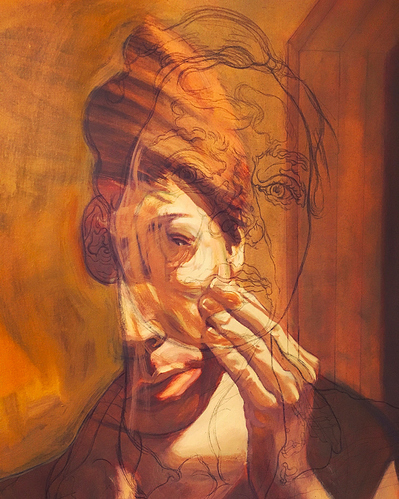DEMOCRACY AS RELATIONSHIP
Jeremy Bendik-Keymer
I think one simple way for artists to engage politically with the roots of democracy is to show people as people living, working, and getting through conflict together. For months now, I have been arguing for this by explaining how it is actually a truer meaning of protest—public witnessing of what is considerable—than what currently goes by the name of “protest” in much “radical” activism, complicit as it has become with neoliberal logic. The history of protest as a history of consequentialist reasoning is beside the point; it is more interest-based politics that reduces people to objects manipulated by affecting the interests that act as levers on them; it is not democratic, squaring up with people as people and working through conflict together. What we need is a history of protest as an openness between people, for only that protest would be truly democratic. And of course that shows us that democracy is still to come, starting with having to work through the intellectual rationalizations that undercut democracy by consistently turning people into objects for so-called “radical” ends. It makes no difference that this persistent tendency to objectification is grounded in such ends, since it is the tendency itself, the form of the interaction, not the ends—now leveraging consequentialist reasoning—that distinguishes democracy as a form of community and communication from neoliberal logic.
It is easy to understand why the rhetoric of working together sounds hollow to people now. Many of the worst policies of Trump are extensions of the policies of Obama—for instance, regarding deportation, entrance bans, or illegal air, missile, and drone strikes that make assassination a continuing tool of US empire and its domination abroad. Wasn’t it Obama in his 2016 DNC speech who, repeating his broken record, urged us to be civically active and a “we” who “can”? Wasn’t it Obama who in his 2012 State of the Union address reduced the classic ends of social justice to neoliberal market consequentialism—“social justice is good because it generates market advantage globally”? But some records are broken because they dishonor their true sounds. The point is to mix those sounds into spirited music. That Obama drew on true democratic forms while hypocritically acting against them does not impugn the forms. It impugns the hypocrisy. We should not reject agency-building and the formation of inclusive community—working through conflict to do that—simply because they have been used by an opportunist, “pragmatic” as he may have been. This is the frustrating truth and obduracy of moral commitments, once justified: they do not break down given vice, cynicism, or appeals to historical fact. What is, in their case, toughens what should be.
What struck me about socially engaged art as a tradition that provides a clue as to how to be democratic is the way in which it frequently joins an ongoing and temporally extended act with participation that is grounded in working through community conflicts. Socially engaged art often spans the gap between community organizing and its social justice work and the moment of disturbing appearance—the disruption of a settled sensible organization—that is an essential feature of protest. The society of the spectacle has made protest into something spectacular, and this has undercut its democratic meaning, the way in which protest would have to appear in an openness between people and continue on toward collective agency to be truly democratic. Community organizing and its social justice work, by contrast, is the opposite of spectacular—thank god!—in its relatively incognito, temporarily extended, and ongoing work to address social injustice and the ills of communities. It does not rupture the sensible order as readily as a protest, which, by disruption, brings something for consideration between people. The question is about how democratic disruption can appear and resound. What I saw in socially engaged art is a handy way to bring out the protest in community organizing alongside the non-spectacular, temporarily extended possibilities of democratic witnessing that bind it into the actual development of collective, democratic agency. Ideally, there is always something of the protest in community organizing and something of community organizing in every protest, so that the twin virtues of social justice and democratic agency are always present.
Enemy Kitchen, an ongoing project started by Michael Rakowitz, Iraqi refugees and combat veterans, 2003—present. Source: michaelrakowitz.com.
The heart of what I advocate is something frustrating. One might even think of it as “frustrating Americana”—or, in the spirit of Fred Moten’s In the Break, the “ensemble.” It is this: democracy is found in relationship. The core of sharing power is sharing life with each other—and this in a non-adaptive way, openly. We don’t share power when one of us has to cave in to it. But when we share power, truly, we are simply sharing life. Now, this “simple” thing, sharing life, is, on consideration, at times complex, just as the easiness of sharing is often the difficulty of working through conflict. The complications, however, do not change the simple challenge, which is to share life.
Chapter One: you + me together, by Chloë Bass and Cleveland residents, May 2015. Source: chloebass.com.
Sharing life is not approached through a shout or an insult, nor by a brick through a window. This central insight of work on domestic violence indeed does, and must, travel to the streets, the courts, and the capital. We have bodies, we have nervous systems, we respond to touch, to being in touch—and transform ourselves differently in fear. If the manner of our interactions is the clue to democratic life, then learning to develop relationships with each other and learning what relationship is are the scenes of democratic education—not the strategic plans to change people’s minds based on their interests or so many attempts at manipulating public opinion. From the standpoint of relationships, there is no public opinion; there are just conflicted people living imperfectly and often by avoiding conflict, even benefiting from it, and there is the possibility of us working through some of these conflicts as we develop collective action that amounts to more than a mere opinion. One enemy of democracy today is that abstraction, “opinion.” And the opposite of abstraction is sharing life. The abstractions secretly validate the shouts. The impersonalization validates the depersonalization. But sharing life requires talking together and relating. As I said, this is frustrating Americana, or it is the ensemble in Moten’s sense from In the Break. The insurrection here is against the logics that undermine relationship.
Part of the difficulty in running along this line is that the virtue of relating has been lost in many ways. The society of the spectacle has hollowed out relationship by fixing it in what Barthes called, in The Neutral, “images” that refuse “oscillation.” Neoliberalism has converted the space between us into a fearful terrain where competition, advantage, and disadvantage swirl. The “radicals” just as the “right” have made “them” vs. “us,” thereby refusing a priori the kind of understanding, the hesitancy and partial-openness, that conditions relating. Relating, however, is a virtue. It is structured as an open habit that improves over a lifetime if one keeps working at it; it demands a seeking-to-connect, and it rests in the moral attitude of personalization. It requires social memory and social practices, cultural attunement, and self-critique. All of these things must be learned, and they can lose their resiliency in a society, can be lost or go dead. They all require time and forms of non-spectacular effort to develop; they require a lot from us, but they end up feeling good.
One frequent refrain from “radicals” is that “all this talk” of relationship is beside the point, because relationships cannot occur when there is no balance of power, no equality of actual standing (or sitting, or being bedridden). Of course, the point about power imbalance is true, as conservative senator Susan Collins said so eloquently in her condemnation of Trump on his campaign trail. But what is beside the point is thinking that the measure of relationships as a guide to democracy is granted or revoked by those who harbor authoritarian measures and half-measures. Relationships are a guide to democracy because they share power most truly in sharing life and because they show us how completely far off, how far-fetched, the machinations of authoritarians of all stripes are to being democratic. These authoritarians may be people ventriloquizing the hegemony of US policy, or they may be “radicals” opposing that hegemony by urging us to turn people into objects, by using the methods of domestic violence for protesting domestic policy. They may be hypocrites who call themselves “Christian” while using their orthodoxy as a silencer and taking out their children in the night (in the morning the children appear to live, but they have been silenced). The point is that there being so many ways to refuse to share power does not impugn relationship. It strengthens relationship’s goodness.
Another problem also appears in what I call “the hypnotism of the authoritarian.” It is that people reject the virtue of relationship as a guide of democracy, because they are focused on the one person, or the group of people, who clearly do not have it. This is fear talking, not strategy (or rather, strategy is the cloaking of fear by cynicism). While most of us have to put up with hegemony and some of us have to flee or defend ourselves against domination, the thing we should be working toward is clearly collective agency. And even domination, more so hegemony, tries to do away with our capacity for defiance, where the truth of democracy lives. The splinter in the lion’s paw is still relationship.
This point is obvious for anyone who has learned self-defense. In aikido, for instance, the “enemy” is simply a person—not an enemy—in—or who has entered into—your community and who, if we are not careful, will continue the cycles of violence in it beyond our potentially violent reaction. To outsmart the cycles of abuse, we begin with relationship—aiki—where the practice of relationship—do—may have to defy, oppose, and convert someone’s violence into a moment of security, a pause, where the person who attacked may reconsider. Through it all, one point is not to shift the brain—so to speak—from the front to the back, where fear and anger live. You can defend yourself from violence, even, and remain in the virtue of relationship.
The reference to aikido also shows us where thoughtfulness, not “strategy,” lives. “Strategy” comes from Greek roots that means a general leading an army. Authoritarians—many “radicals” or those in the White House—love strategy. It means that they are still in the army. But community is not an army, domestic life should not be modeled on domestic violence, and democracy is not found in warfare, whatever you may want to say defensively about the ways in which historical “democracies” have repeatedly failed to live up to democracy by being imperial powers. We always use means to our ends, we often consider these means, which is to say that we calculate, work out, try on for size, explore and so on … these very means. But that is a far cry from strategy. The approach to organizing what we have to do, or want to do, or wish to, when we approach from the virtue of relationship is thoughtfulness. It needn’t be what Bernard Williams called “one thought too many”—there, a side-step as someone attacking enters, because then you are by their side where they cannot hit or kick you and you have a way to their arm joints and their neck, where, when they persist, you can help them move themselves to the ground to reconsider this violence. What would the protest analogue be? It is clearly non-violence. How can self-defense be non-violence? But it is clearly not violent. The issue, however, is not even the physical per se—it is the underlying relationship. Are “they” objects—or people? People-objects, or people-people? Are we working from relationship or for our side in the “war”? The logic of empire becomes the logic of radicals.
This drift that has just occurred—you can see it there in the last paragraphs—is part of the problem. The brain tracks fear so easily, loses its mindfulness. That opponents of democracy as a guide to relationship turn immediately to domination and hegemony and wage them as counter-examples to reveal your naïve faith in humanity is also part of the problem. Oppressive things are certainly with us, but they do not diminish the virtue of relationship. Instead, they toughen it. The virtue of relationship becomes more meaningful and more relevant in such contexts. It’s not just Dr. King or the sensei; it’s people who defy a vicious system in a way that eschews the reactive cycle. Do we know how to do that?
As I said at the outset, one of the things artists can do now to engage with the roots of democracy is to help people live, work, and get through conflict together. This plain, ordinary thing is no joke, unless a joke is what is needed for plainly ordinary life. What the virtue of relationship does is to help us understand the ordinary in a way that is not colonized or subverted by logics of depersonalization, that is, of objecthood. To see this point, we have to understand what it is to be a person, how people appear as people with each other and to each other. Certainly, nothing can be as threatening as another person, but this is because what we expect from people is love or its ordinary neighbor, genuine consideration. Yet disillusioned time and again by the process that is misnamed “growing up,” we learn to cover our expectation in a view of people as people-objects, not people-people. This is because people can be okay, but they can also be total assholes. Or not totally, never totally anything. Life between people is therefore a dynamic altering back and forth, an aspect-perception-attuned practice, of sorting people-people from people-objects, that is, when they treat you as more of an object than a person, or you, anticipating reactively this event (a reaction that might even become a habit, even a doxa), you treat them as something to be moved around, used, or otherwise turned into a resource, a “human” resource, even. But people-people appear differently. And when they do, and we do too, we are more of ourselves and can live alongside. Do you see the point about democracy?
Detail from Oblivion by Misty Morrison, Pittsburgh Center for the Arts, 2017.
Relationships are characterized by an interior infinity which opens the life one shares to agency and creativity of a homely sort. They are the opposite of what one nineteenth-century writer called “the despair of finitude,” in which we cannot see each other beyond the grid of roles, advantages and subjections that try to keep everything in their place, all lockstep. The despair of finitude characterizes much writing on politics now, under the guise of one of many cynicisms or in stratagems of “us against them.” No wonder that the virtue of relationship jars against the hard knock so roughly, right there where in a shudder one must reject its naïve and “anemic” grain, since it has touched on what you are missing. But being in touch with each other appears within ordinary life to provide a dignity to what we know is ordinary between us and so is other than, a break from, the world of objects and subjections, which is, in any case, not a democratic one, not really. Being in touch with each other involves an interior infinity where life between us can go on (and on). That is what is so disturbing about relationships—they show us that ordinary life gives the lie to all the machinations.
One last thought, as I head out the door. Given the ubiquity of neoliberal logic, probably the most important, long-term way in which we can develop the virtue of relationship is in the practice of turning the depersonalizing world of economy into the ordinary world of relationships. This would be to convert economy to ecology—the logic of being-at-home. By reabsorbing the market back into relationship, we clear off the main impediment to thinking democratically today—the view that it is irrational to be anything but competitive in a muffled war where some always have to lose. “Solidarity economies,” for instance, do this—one could even argue that what they truly “exchange” is not goods but relationships, in which goods are conveyed by need, desire, trust and fairness. But all sorts of ways of reclaiming the meaning of the public and the common do too.

NYC Real Estate Cooperative, co-organized by Caroline Woolard. Credit: Art21 / New York Close Up.
Consider how the virtue of relationship modifies the anti-capitalist tactic (note the military metaphors again—authoritarianism loves a lefty) that aims to “block” or “disrupt” capital’s circulation. The collective agency that reabsorbs private goods into public ones, and that gains a foothold to pivot in carrying a social trend away from privatization toward the sustenance, establishment, and proliferation of public goods for all in a community—this does disrupt the free flow of capital’s circulation, but slowly, in small, almost quiet ways over time as people develop a social ecology, not simply a spectacle, by which to defy hegemony and provide a safe space against domination. Indeed, this very slowness, the way relationship opens up the ordinary as a site of interpersonal infinity, is part of what makes us safe. Because democracy is in the virtue of relationship, it is always in the body too.
—Cleveland, Ohio, April 2017
×


